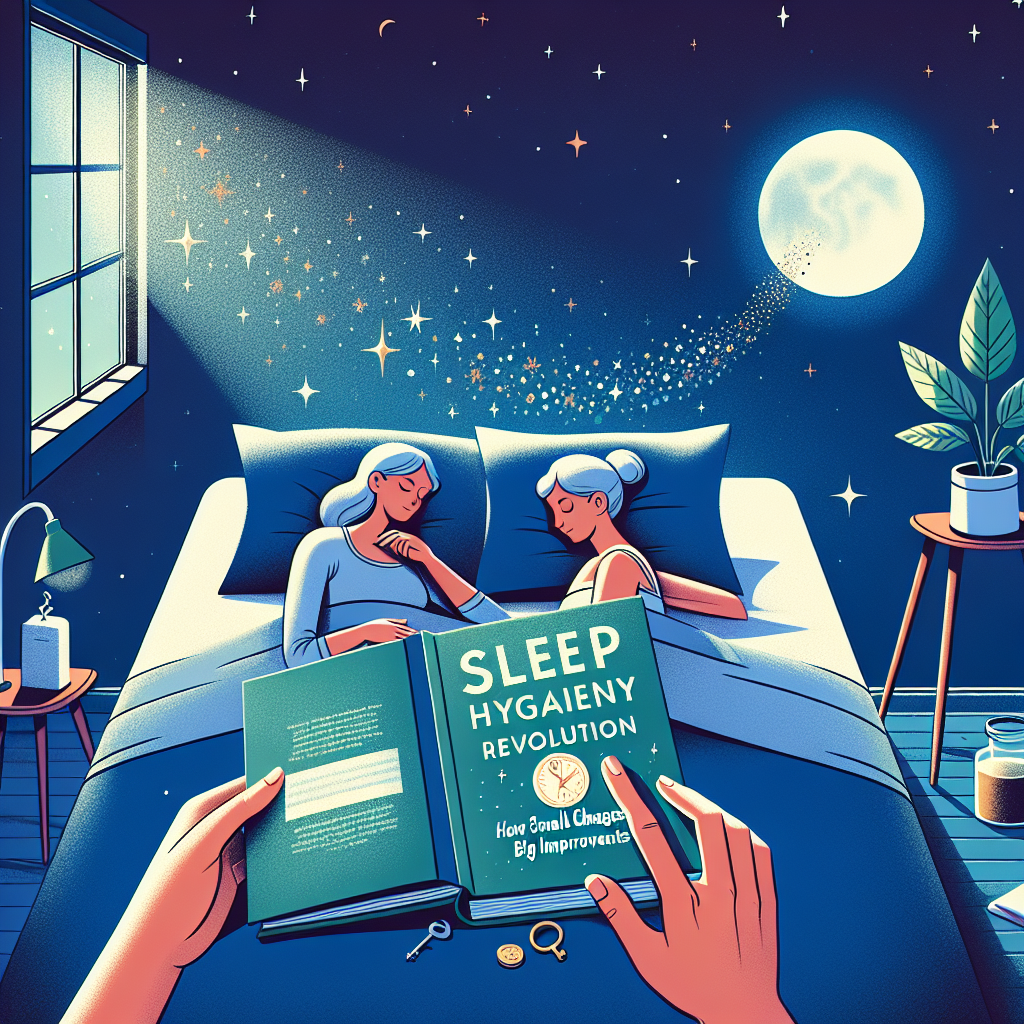
The Sleep Hygiene Revolution: How Small Changes Lead to Big Improvements in Your Life
Introduction
Imagine waking up every morning feeling fully rejuvenated, ready to tackle whatever the day throws your way. This scenario seems unattainable for many, as statistics reveal that nearly one-third of adults report insufficient sleep. The repercussions of poor sleep hygiene are not merely about feeling groggy—studies link inadequate rest to a multitude of health issues, including obesity, diabetes, and cardiovascular diseases. However, this despair has fostered what can be termed the "Sleep Hygiene Revolution." This movement emphasizes how small, actionable changes in our nightly routines can yield considerably positive outcomes.
Join us as we dive deep into this fascinating topic—the sleep hygiene revolution—and explore how small changes lead to significant improvements. By the end of this guide, you’ll be equipped with the knowledge to revolutionize your sleep and, consequently, your life.
The Fundamentals of Sleep Hygiene
What is Sleep Hygiene?
Sleep hygiene refers to a series of practices and habits that are conducive to sleeping well on a regular basis. Incorporating proper sleep hygiene techniques not only improves the quality of sleep but also enhances overall well-being.
Why Sleep Hygiene Matters
According to the Centers for Disease Control and Prevention (CDC), chronic sleep deprivation can lead to serious health complications. When we prioritize sleep hygiene, we are taking significant strides in optimizing our mental and physical health.
The Sleep Hygiene Revolution: A New Paradigm
The sleep hygiene revolution is not merely about what to do but also encompasses an understanding of why these practices work. Studies show that even minor adjustments—like turning off screens an hour before bed or optimizing your bedroom environment—can make a notable difference.
The Sleep Hygiene Revolution, in Numbers
| Aspect | Poor Sleep Hygiene | Improved Sleep Hygiene |
|---|---|---|
| Average Hours of Sleep | 6 hours | 8 hours |
| Productivity Level | 60% | 90% |
| Reported Mood Levels | 5/10 | 8.5/10 |
| Risk of Chronic Diseases | High | Low |
The table above showcases the drastic differences that adopting effective sleep hygiene practices can make.
Key Components of Effective Sleep Hygiene
1. Consistency is Key
Establishing a Regular Sleep Schedule
One of the easiest yet most effective changes you can implement is sticking to a consistent sleep schedule. Going to bed and waking up at the same time every day regulates your body’s internal clock, which can enhance your sleep quality.
Case Study: The Case of Clara
Clara, a 34-year-old marketing executive, found herself battling fatigue and low productivity. After researching sleep hygiene, she decided to commit to a consistent sleep schedule—going to bed by 10 PM and waking up at 6 AM. Within two weeks, Clara reported feeling significantly more alert and productive at work.
2. Create an Optimal Sleep Environment
Lighting, Temperature, and Noise
An optimal sleep environment plays a crucial role in the quality of your rest. Dim lights and cooler temperatures tend to promote melatonin production, aiding sleep. Using blackout curtains to block external light can further enhance your sleeping environment.
Case Study: The Sleep Sanctuary of John and Sarah
John and Sarah, a couple in their late 40s, transformed their bedroom into a “sleep sanctuary.” By decluttering, investing in blackout curtains, and maintaining a cool room temperature, they noted a significant increase in their sleep satisfaction scores.
3. Mind the Screens
The Impact of Blue Light
Our devices emit blue light, which can drastically affect our sleep patterns. The sleep hygiene revolution encourages unplugging at least one hour before bedtime. This small change can lead to better melatonin production and improved sleep quality.
Case Study: The Digital Detox of Emily
Emily, a 27-year-old teacher, struggled with falling asleep until she embarked on a week-long digital detox. By turning off her phone and avoiding screens before bed, she fell asleep 30 minutes faster on average and woke up feeling more refreshed.
4. Craft a Relaxing Pre-Sleep Routine
Importance of Wind-Down Time
Engaging in quiet activities like reading or taking a warm bath can signal your body that it’s time for sleep. The sleep hygiene revolution advocates for a calming pre-sleep routine to prepare the mind and body for rest.
Case Study: The Transformative Ritual of Mark
Mark, a 45-year-old programmer, was battling insomnia caused by stress. After attempting different relaxation methods, he found success through a consistent pre-sleep routine that included yoga and meditation. His sleep quality improved, allowing him to regain focus at work.
5. Mind What You Eat and Drink
The Connection Between Diet and Sleep
Certain foods and beverages can significantly affect your ability to fall and stay asleep. Avoiding large meals, caffeine, and alcohol before bed contributes significantly to improved sleep quality.
Case Study: The Culinary Choices of Jennifer
Jennifer, a 32-year-old writer, noticed changes after adjusting her evening diet. Switching from coffee to herbal tea and avoiding late-night snacking resulted in fewer awakenings during the night, enhancing her overall well-being.
A Closer Look: Overcoming Common Sleep Disorders
Sleep Apnea
Sleep apnea can severely disrupt sleep cycles. If you suspect you have this condition, seek medical advice. The sleep hygiene revolution strongly recommends consulting a healthcare professional for personalized interventions.
Insomnia
For those grappling with insomnia, adopting consistent sleep hygiene practices such as avoiding naps and managing stress levels can be beneficial.
The Psychological Benefits of Good Sleep Hygiene
Improving Mental Health
Quality sleep is directly linked to improved mental health. Practicing good sleep hygiene might not only get you more sleep; it could also alleviate anxiety and depression symptoms.
Enhancing Cognitive Function
Well-rested individuals tend to perform better in cognitive tasks, showing improvements in memory, problem-solving, and decision-making abilities.
The Future of the Sleep Hygiene Revolution
Technology’s Role
With the rapid advancement of technology, we see devices and apps specifically designed to track and improve sleep hygiene. Although they can provide insights, balance is key—avoid becoming overly reliant on technology for a good night’s rest.
Emerging Research in Sleep Science
Recent studies focusing on sleep hygiene are uncovering new evidence on the importance of sleep. Researchers are exploring everything from the influence of natural light to the benefits of afternoon naps.
Conclusion
The sleep hygiene revolution reveals that change does not have to be monumental to be effective. Small, intentional adjustments to your nightly routine can lead to big improvements in your health and overall well-being. Now armed with these insights and guided by the testimonials of real-world cases, it’s time for you to take actionable steps toward enhanced sleep hygiene.
Start with one change this week—be it setting a consistent bedtime or transforming your sleep space—and observe how it enhances your quality of life. Remember, the journey to better sleep begins with small steps, leading to monumental transformations.
FAQs
1. What is sleep hygiene?
Sleep hygiene refers to practices that promote better sleep quality and overall well-being, including a consistent sleep schedule and creating an optimal sleep environment.
2. How does diet affect sleep?
Certain foods and beverages, like caffeine and heavy meals, can disrupt sleep patterns. It’s advisable to avoid them in the hours leading up to bedtime.
3. Can technology help with sleep?
Yes, various apps and devices can help track your sleep and offer tips. However, it’s important not to rely solely on technology for good sleep hygiene.
4. What if I’m still having trouble sleeping after making changes?
If you’ve made lifestyle adjustments and still struggle to sleep, consult a healthcare professional for further investigations into potential sleep disorders.
5. How quickly can I expect to see improvements in my sleep?
Many individuals report improvements within a week of implementing good sleep hygiene practices, though this varies from person to person.
With the right approach, you can adopt these simple yet effective changes, marking your entry into The Sleep Hygiene Revolution: How Small Changes Lead to Big Improvements. The path to better sleep is not only attainable but also essential for a healthier, happier life.














